While there are many parronts that exclusively have parrots and other types of birds, the vast majority share their homes with a variety of animals. I’m a great example; I have Symon and Murphy, as well as two rabbits, two hamsters, and I care for dogs a few days a week in my home. Heck, I’m even babysitting two rowdy kittens for a week while their dad is on a vacation! Sharing my life with many kinds of pets brings me great joy and fulfillment, but it doesn’t come without certain risks. Have you ever sat back to think about how some of your pets may be predators, and others may be prey?
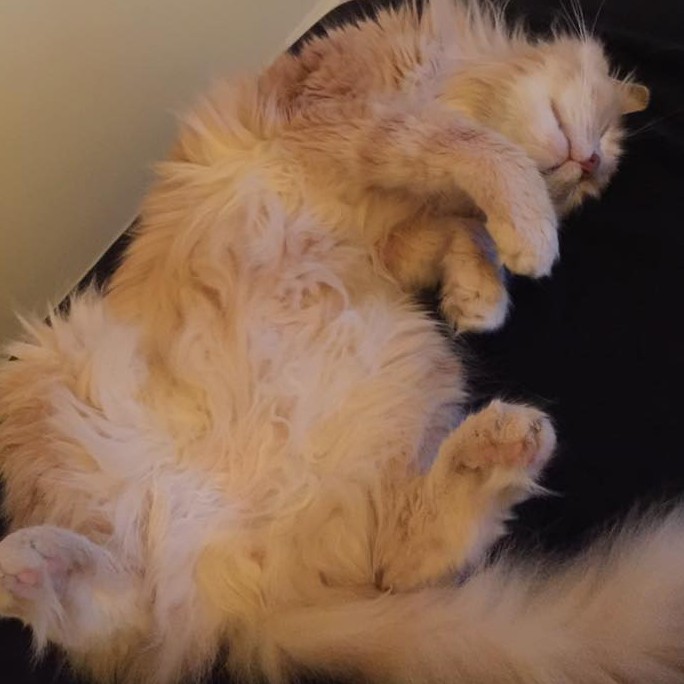
We, as humans, often forget that our pets are powered by instinct, and
may not necessarily share our love and compassion for animals of other species. Let’s consider our favorite predator species of pets – dogs, cats, and ferrets. Cats are notoriously playful hunters, and often may play with their prey rather than eating it. Ferrets are more instinct-driven and are likely to go directly for the kill.
Although we shouldn’t assume that the family dog, cat, or ferret would make a meal of us if they had the chance, we SHOULD assume that they would do so with a prey species. Cats are well-known bird hunters, but ferrets are also likely to view your parrot as a snack. Both cats and ferrets are calculating, watchful, and quick-to-pounce. It’s likely that once they set their mind on attacking your parrot that you won’t be able to stop them – so you’ll want to prevent this from happening before it crosses their minds! While it may be tricky, it is not impossible to have both predator and prey, and keep everyone safe, at the same time.
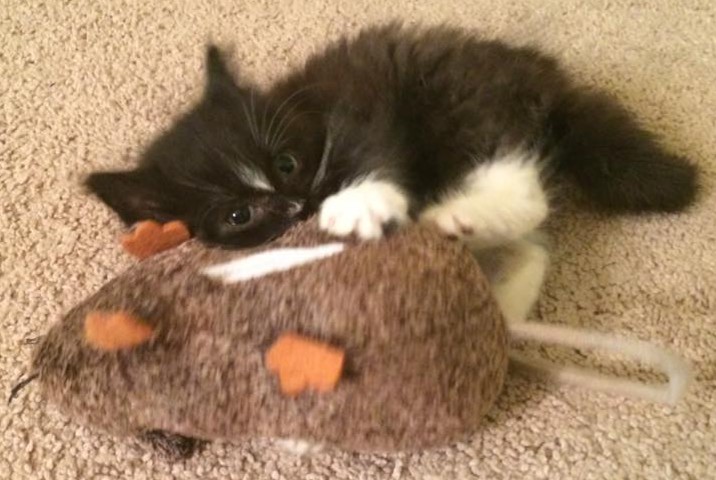
Many cat owners keep the litter box for their cats in the basement to avoid smelling the box throughout the home. This may also be advantageous if
you have parrots. By placing the litter box, food, water, and a cat tree or bed in the basement, you’ll be able to lock the cat downstairs while you let the birds out to play, or when you leave the home to work. You can do this with any room in the house as long as there is a securely shutting door.
If you live in a studio apartment like I do, it may be more difficult to keep the cat separated from the birds and the bird cage. When I babysit cats and kittens, the cats are always caged when I leave the house, and when the birds come out to play. Caging cats is not a common practice, unlike crating dogs, since most cats are litter box trained and can pee or poo in the home at their leisure; but, caging your cat is not any more cruel than caging any other pet – be it a dog, bird, or ferret!
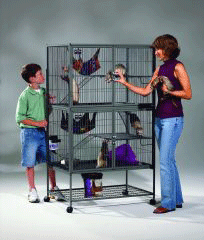 Since I mentioned ferrets, they’re another pet that benefits from having a large, well-kept cage to call their own. Did you know we carry a large variety of ferret cages, including the Ferret Nation cage? Although designed specifically with your slinky ferrets in mind, this cage is also suitable for the temporary caging of cats and kittens! There’s room for a litter box, a comfy bed, and you can easily attach crocks for food and water to the cage bars.
Since I mentioned ferrets, they’re another pet that benefits from having a large, well-kept cage to call their own. Did you know we carry a large variety of ferret cages, including the Ferret Nation cage? Although designed specifically with your slinky ferrets in mind, this cage is also suitable for the temporary caging of cats and kittens! There’s room for a litter box, a comfy bed, and you can easily attach crocks for food and water to the cage bars.
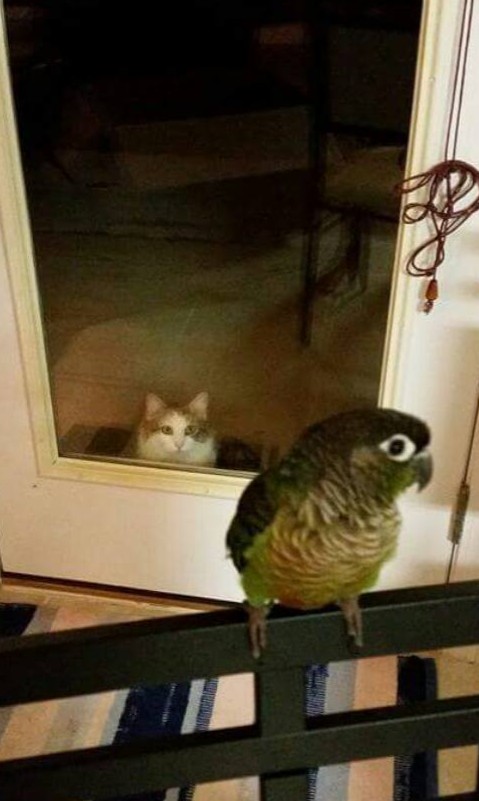
For when your bird is caged and kitty is roaming free, you’ll want to keep a watchful eye that no curious paws make their way inside the bird cage. Cats tend to like perching in high points – and bird cages tend to be tall. While the cat may not be directly threatening your bird with pointed claw, the presence of a predator directly overhead is likely to unnerve and stress your birds. You can deter kitty perching by placing “donuts” of tape on top of a sheet over just the top of the cage, so when the cat jumps up, the tape sticks to her paws. It’s likely that this will cause her to immediately jump down. A quick squirt from a water bottle is also a harmless reprimand that will help curb unwanted kitty behaviors.
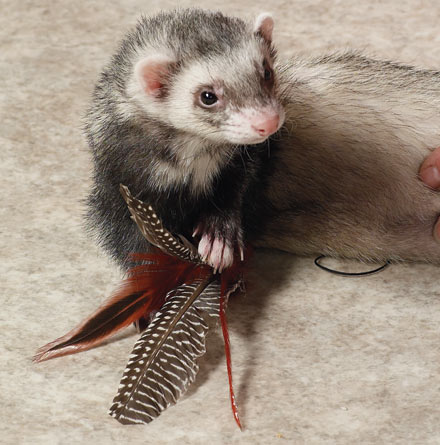 While cats may be very non-threatening to your birds after an introductory and adjustment period, it is advised to NEVER allow ferrets near your parrots – EVER. Although domesticated, ferrets are more brutal hunters than cats and able to squeeze their bodies through very small openings. A bird cage with 1 inch bar spacing could likely be infiltrated by a very persistent ferret; once the ferret is inside the cage, there’s no way for your parrot to escape. So, if you must own ferrets and birds at the same time, always keep the ferrets away from anything that may be considered a scent trail – don’t allow the ferrets in direct sight of the birds, in the same room, or bring the birds into the room where the ferret cage is kept. To do so is begging for an accident.
While cats may be very non-threatening to your birds after an introductory and adjustment period, it is advised to NEVER allow ferrets near your parrots – EVER. Although domesticated, ferrets are more brutal hunters than cats and able to squeeze their bodies through very small openings. A bird cage with 1 inch bar spacing could likely be infiltrated by a very persistent ferret; once the ferret is inside the cage, there’s no way for your parrot to escape. So, if you must own ferrets and birds at the same time, always keep the ferrets away from anything that may be considered a scent trail – don’t allow the ferrets in direct sight of the birds, in the same room, or bring the birds into the room where the ferret cage is kept. To do so is begging for an accident.
While cute, cuddly, and sweet with humans, cats and ferrets are not to be your bird’s best friend. Just as we talked about with dogs, even animals which have previously interacted without incident could eventually have an accident ending in the serious injury, or death, of your feathered friend. How do you manage a household with cats or ferrets and birds?
5,610 total views, 3 views today
